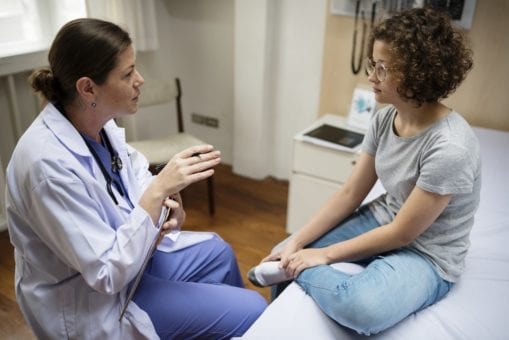Seeking treatment for anorexia nervosa at a well-established treatment center can save your life and help you develop positive coping skills in order to be successful after treatment. Anorexia nervosa treatment is aimed at weight restoration and also will help you recognize the underlying triggers associated with your disorder, help you build a healthy relationship with food and body image, and help you establish a comprehensive treatment plan.
What is a treatment plan?
Developing a treatment plan is a necessary initial step for you and your treatment team to take upon entering treatment for your eating disorder. The treatment team is usually composed of a multidisciplinary team of healthcare professionals and there are different levels of care offered depending on the severity of your disorder as well as multiple types of therapies that can be used to treat anorexia nervosa. Your treatment plan can change from when you are admitted into residential treatment to when you enter recovery in the real world and begin outpatient treatment.
What will my treatment plan consist of?
Your plan for treatment of anorexia nervosa will generally consist of the following:
- Dietitians and nutritionists
- Psychiatrists
- Psychologists
- Eating disorder counselors
- Cognitive-behavioral therapy
- Dialectical Behavior Therapies
- Mindfulness
- Somatic Experiential
- Body Positive Curriculum
- Exposure Response Prevention (ERP) based dietary program
- Discharge planning
- Positive coping skills
- Aftercare and recovery follow-up
- Family-centered therapy
- Teaching body positive principles
- Dietary program
The importance of a comprehensive dietary program as part of a treatment plan.
Eating disorders have very little to do with food, in fact, eating disorders arise because of underlying emotional and mental triggers. Control of food and body shape is the result of poor coping skills associated with these underlying triggers. Upon entering treatment for anorexia nervosa, it is important to establish a comprehensive dietary program in your treatment plan. The following are components of a dietary program:
- Individualized menu planning
- Hands-on kitchen skills and meal preparation
- Food variety and moderation to maintain balance
- Fun food challenges
- Exposure and Prevention Therapy: grocery shopping, clothing shopping, and restaurant challenges
- Therapeutic family meals
Psychotherapy treatment for anorexia nervosa
Psychotherapy is the mainstay treatment approach for treating anorexia nervosa and include the following:
- Cognitive-behavioral therapy (CBT)
- Interpersonal psychotherapy (IPT)
- Group therapy
- Family-based therapy (FBT)
Before choosing a treatment center, make sure they have a comprehensive treatment plan in place. This treatment plan is the backbone of your care and can aid you throughout your recovery process. Although the treatment plans may be similar, each person experiences different emotions and their own versions of highs and lows, triumphs and defeats, loves and losses. Recovering from an eating disorder means more than the obsession with scales, measuring cups, hiding food, constant guilt and baggy clothes. It means learning to appreciate yourself for who you are without obsessing about your body image or food. It means mending broken relationships that have been damaged because of your eating disorder. It means learning to cope with negative emotions associated with past abuse and trauma. Recovery means overcoming your battle with low-self esteem and not listening to the advertisements, fashion magazines and all of the negative media telling you what your body should and shouldn’t look like.
